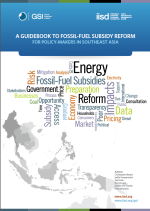Chris Beaton, Research and Communications Officer for IISD, discusses the impacts of fossil fuel subsidies, the challenges with removing them, and the path to reform, including an introduction to the Global Subsidy Initiative’s latest publication A Guidebook to Fossil Fuel Subsidy Reform.
Understanding the issues
What would you do if you had US$ 500 billion? Support infant industries? Fund nutrition and education programmes? Invest in technology to avert climate change? Every year, governments dedicate this sum to something else entirely: subsidizing fossil-fuel consumption.
Lots of people make the mistake that this is rich countries giving money to “big oil”. Actually, it is mostly governments in developing countries using an easy, uncomplicated policy to either lower living costs for the poor, make themselves popular, or both. (Subsidies for oil companies do exist, but they are not well reported and hard to count. The Global Subsidies Initiative (GSI) estimates that such “production subsidies” are worth around an additional US$ 100 billion per year on average, adding up to a total of US$ 600 billion in fossil-fuel subsidies per year.)
This doesn’t mean that fossil-fuel subsidies are a good thing. In most countries, they aren’t very good at helping the poor. The International Energy Agency estimates that only around 8% of spending each year—that’s US$ 40 billion, out of US$ 500 billion—reaches the bottom 20%. And of course, giving away money to make yourself popular is hardly good governance.
As if this weren’t enough, fossil fuel subsidies have many unintended impacts. First, they are often a financial liability, not unlike a risky mortgage that might become too expensive if interest rates rise. In many countries, rising crude oil prices have driven subsidies to unaffordable levels, diverting resources from more worthwhile public priorities.
Second, fossil-fuel subsidies are a perverse incentive. Cheap fuel encourages over-consumption and discourages investment in efficiency and alternative energy technologies. This second effect shouldn’t be underestimated. Pricing is the most powerful signal for influencing market behaviour. It can lock in investments that will determine the nature of an economy for decades to come. And subsidies to incentivize green markets and green technologies must then overcome the barriers created by fossil-fuel subsidies, meaning more wasted money.
The billion dollar question
All of this begs one, billion dollar question: if fossil-fuel subsidies are so expensive and so counter-productive, why haven’t they been reformed already?
Indeed, the same question could be asked about perverse subsidies in many sectors. The negative impacts of the most well-intentioned food, fish and water subsidies have been well documented for years. Why have economies around the world still not made much headway in rationalizing this most basic of things—how they spend their money?
The Global Subsidies Initiative (GSI) believes that understanding this conundrum—and overcoming it—is probably thechallenge for the green growth policy community in the next decade.
After all, reforming perverse subsidies can unlock much-needed green finance. It will also pave the way for many of the more complicated economic tools that are needed to internalize negative externalities, such as carbon pricing or ecosystem payments, which would otherwise be actively undermined by perverse subsidies. And it can have significant social benefits— improving the efficiency of welfare systems and showing that green growth can be pro-prosperity and pro-equity.
In addition, subsidy reform is tough. The challenges that are involved can provide policy-makers with vital insights into the broader economic restructuring that will need to take place to reach a green economy. And lastly, it is usually a domestic issue. It doesn’t need long, complicated international agreements before change is possible. It’s an opportunity to take one large step towards green growth now.
The path to reform
When you’re new to fossil-fuel subsidies, it’s easy to assume that the reason for inaction to date is “governments”—that policy-makers either don’t know the reasons for reform or aren’t brave enough to implement them. We just need to educate them, so this line of thinking goes, and the world will change.
In fact, the GSI spends a lot of time talking with policy-makers and politicians about subsidies, and it is fairly rare to meet officials in high-subsidizing countries who are not already familiar with the economic argument for fossil-fuel subsidy reform. Finance Ministries in particular are traditionally pro-reform. Many governments would dearly like to reform their fossil-fuel consumption subsidies. Their problem is not why but how.
How to implement a policy change that it is highly unpopular? How to prevent reform itself from having unintended impacts and harming the vulnerable? How to convince stakeholders that reform really is in their best interests? How to replace subsidies with more efficient, sophisticated welfare measures? What welfare measures to use instead? How to ensure that reallocated funds are not diverted by corruption? How to raise awareness about subsidies and reform?
In particular, the technical questions surrounding subsidy reform—how it will affect prices, how to mitigate unwanted negative impacts—are less of a problem than the political questions. How to make a difficult policy change politically possible? How to resist the pressures of well-organised interest groups?
The traditional answer to this dilemma would be to wait for some “strong”, “visionary” leaders. But by 2013, we have been waiting for some time. And it is not even clear that we should desire such leaders, who may, it is true, be capable of pushing through difficult change, but often at the cost of bitter opposition from many domestic stakeholders, and long-lasting resentment from those who perceive themselves to have lost out. Green growth is an iterative game, where the experience of one policy change can ease or frustrate those in years to come.
The GSI believes that, rather than strong and visionary leaders, what countries need is strong, visionary policy. With thorough research, political engagement and a high level of transparency, it is possible to develop a highly credible plan for reforming subsidies, and, at the same time, to create the political space where reform is possible, even if it is a highly controversial issue.
This is not to suggest that there is a “one-size-fits-all” strategy for reform. But there are fairly generic processes that countries can go through to design a plan that is specific to a country’s needs, capacity and circumstances, and that take into account its political realities. At the heart of this is awareness-raising, dialogue and measures to ensure that government promises are credible.
 The GSI’s latest publication, A Guidebook to Fossil-Fuel Subsidy Reform, is a first effort to gather together policy advice on this kind of national planning process. It discusses how countries can review pricing systems, use research methods to project the impacts of reform, select mitigation measures to manage negative impacts, consult with stakeholders and identify messages and media to use in communications, with illustrations from country experience around the world.
The GSI’s latest publication, A Guidebook to Fossil-Fuel Subsidy Reform, is a first effort to gather together policy advice on this kind of national planning process. It discusses how countries can review pricing systems, use research methods to project the impacts of reform, select mitigation measures to manage negative impacts, consult with stakeholders and identify messages and media to use in communications, with illustrations from country experience around the world.
It provides no easy “answer” to the problem of fossil-fuel subsidy reform—but it does set out frameworks and tools to help countries identify where their subsidy reform plans may be missing important components and what they can do to fill in the gaps. It is far from the final say in this issue area. But it is at least a first step towards helping identify nationally appropriate solutions that will bring about transformative change, and foster understanding and support for this change.
Our generation has been brought up watching films and TV shows that suggest you can “be a millionaire” by answering a few, simple, general questions. In reality, when it comes to our toughest economic problems, that sit at the heart of social and environmental issues, we must ask ourselves many, hard and specific questions, if we are to have a chance of unlocking green growth.

